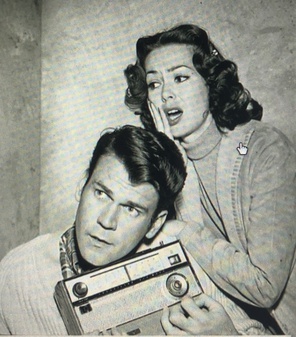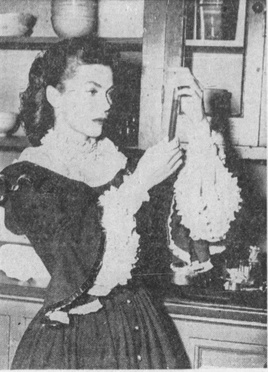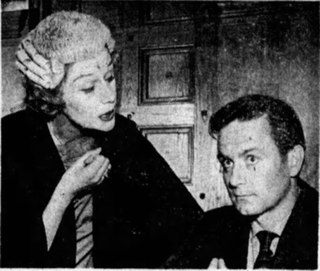
Playhouse 90 is an American television anthology drama series that aired on CBS from 1956 to 1960 for a total of 133 episodes. The show was produced at CBS Television City in Los Angeles, California. Since live anthology drama series of the mid-1950s usually were hour-long shows, the title highlighted the network's intention to present something unusual: a weekly series of hour-and-a-half-long dramas rather than 60-minute plays.

The Family Nobody Wanted is a 1954 memoir by Helen Doss. It retells the story of how Doss and her husband Carl, a Methodist minister, adopted twelve children of various ethnic backgrounds.
"Massacre at Sand Creek" was an American television film broadcast on December 27, 1956, as part of the CBS television series, Playhouse 90. It was the 13th episode of the first season.
"Misalliance" was an American television play broadcast live on October 29, 1959, as part of the CBS television series, Playhouse 90. It was the third episode of the fourth season of Playhouse 90 and the 120th episode overall.
"The Tunnel" was a pre-recorded American television play first broadcast on December 10, 1959, as part of the CBS television series, Playhouse 90. It was the sixth episode of the fourth season of Playhouse 90 and the 123rd episode overall.
"The Silver Whistle" was an American television play broadcast live on December 24, 1959, as part of the CBS television series, Playhouse 90. It was the seventh episode of the fourth season of Playhouse 90 and the 124th episode overall.

"Alas, Babylon" was an American television play broadcast on April 3, 1960, as part of the CBS television series, Playhouse 90. It was the 13th episode of the fourth season of Playhouse 90.
"The Big Slide" was an American television play broadcast on November 8, 1956, as part of the CBS television series, Playhouse 90. It was the sixth episode of the first season of Playhouse 90. Red Skelton and Shirley Jones starred in the play about a silent movie star. Skelton was nominated for a Primetime Emmy Award for best performance by an actor. Martin Manulis was the producer, and Ralph Nelson was the director.

"A Town Has Turned to Dust" is an American television play broadcast live on June 19, 1958, as part of the second season of the CBS television series Playhouse 90. Rod Serling wrote the teleplay, and John Frankenheimer directed. Rod Steiger and William Shatner starred.

"Helen Morgan" is an American television play broadcast on May 16, 1957, as part of the CBS television series, Playhouse 90. It was the 33rd episode of the first season of Playhouse 90.

"Heart of Darkness" was an American television play broadcast on November 6, 1958, as part of the CBS television series, Playhouse 90. It was the seventh episode of the third season of Playhouse 90. The play was adapted from Joseph Conrad's novella, Heart of Darkness.

"The Blackwell Story" was an American television film broadcast live on February 28, 1957, as part of the CBS television series, Playhouse 90. It was the 22nd episode of the first season of Playhouse 90. Joanne Dru played the role of Elizabeth Blackwell.

"Heritage of Anger" was an American television play broadcast on November 15, 1956, as part of the CBS television series, Playhouse 90. It was the seventh episode of the series.

"Eloise" was an American television play broadcast on November 22, 1956, as part of the CBS television series, Playhouse 90. It was the eighth episode of the series.

"The Dark Side ofarth" was an American television play broadcast live on September 19, 1957, as part of the CBS television series, Playhouse 90. It was the second episode of the second season. Rod Serling's teleplay told the story of a band of Hungarian freedom fighters captured by the Soviets in 1956.
"Nightmare at Ground Zero" is a television play that was broadcast by CBS on May 15, 1958, as part of the television series, Playhouse 90. It was written by Rod Serling and Paul Monash based on the book by John C. Clark and Robert Cahn.

"The Second Man" was an American television play broadcast live on February 12, 1959 as the 100th episode of the CBS television series, Playhouse 90. The cast was led by James Mason. The teleplay was written by Leslie Stevens as an adaptation of the novel, The Second Man, by Edward Grierson.
"A Trip to Paradise" is an American television play broadcast on March 26, 1959 as part of the CBS television series, Playhouse 90. The cast includes Susan Oliver and Burt Brinckerhoff. Buzz Kulik is the director, and the teleplay is written by Adrian Spies.

"The Jet Propelled Couch" is an American television play broadcast on November 14, 1957, as part of the second season of the CBS television series Playhouse 90. Burgess Meredith and James Clark directed. Donald O'Connor, David Wayne, and Peter Lorre starred.

"For I Have Loved Strangers" was an American television play broadcast on December 19, 1957, as part of the second season of the CBS television series Playhouse 90. Elick Moll wrote the teleplay based on a story by Don Murray and Fred Clasel. Franklin Schaffner directed, Martin Manulis was the producer, and Hedda Hopper hosted. Don Murray and Hope Lange starred. The story was based on Murray's personal experience working with European refugees. Both Murray and Lange donated their salaries from the production to the Homeless European Land Program (HELP) founded by Murray.













